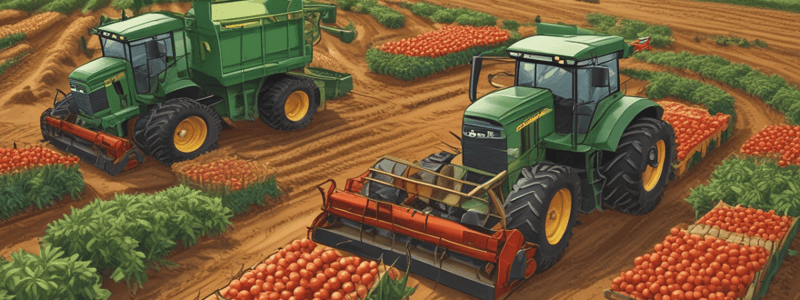Podcast
Questions and Answers
What best describes a futures contract in commodity trading?
What best describes a futures contract in commodity trading?
- An agreement that allows immediate purchase of a commodity at its current price.
- An agreement to buy or sell a commodity at a predetermined price on a specific future date. (correct)
- A contract that guarantees a return on investment for commodities traded.
- An agreement that facilitates exchange of commodities without any price specification.
Which of the following is NOT considered a raw commodity?
Which of the following is NOT considered a raw commodity?
- Gold
- Cereal (correct)
- Sugar
- Iron
How does standardization affect commodity trading?
How does standardization affect commodity trading?
- It increases the price volatility for different types of commodities.
- It eliminates the need for commodity exchanges.
- It allows for the creation of unique quality grades for each product.
- It facilitates bulk trading at uniform prices across various markets. (correct)
What is a commodity pool in the context of trading?
What is a commodity pool in the context of trading?
Which exchange is one of the most prominent for commodity trading in the United States?
Which exchange is one of the most prominent for commodity trading in the United States?
What differentiates options contracts from futures contracts?
What differentiates options contracts from futures contracts?
Which of the following commodities is typically used in construction?
Which of the following commodities is typically used in construction?
What is the primary function of a commodity pool operator?
What is the primary function of a commodity pool operator?
Which role focuses on offering advice regarding commodity investing and market trends?
Which role focuses on offering advice regarding commodity investing and market trends?
What distinguishes an independent introducing broker-dealer from a guaranteed one?
What distinguishes an independent introducing broker-dealer from a guaranteed one?
What is a key responsibility of back-office personnel in commodity trading?
What is a key responsibility of back-office personnel in commodity trading?
Which of the following is a common sign of potential money laundering in commodity trading?
Which of the following is a common sign of potential money laundering in commodity trading?
Which practice should front-office personnel observe to prevent money laundering?
Which practice should front-office personnel observe to prevent money laundering?
What role does a futures commission merchant (FCM) primarily perform?
What role does a futures commission merchant (FCM) primarily perform?
Which of the following would be considered suspicious when monitoring client activity?
Which of the following would be considered suspicious when monitoring client activity?
Flashcards are hidden until you start studying
Study Notes
Understanding Commodities
- Commodities are basic, unprocessed materials or agricultural products traded in bulk.
- Essential goods originating from nature; examples include sugar, salt, oil, soy, and gold.
- Commodities can be raw (e.g., unprocessed milk) or processed (e.g., packaged cereal).
The Commodity Trade Industry
- Commodities of similar quality are interchangeable, promoting bulk trading at uniform prices.
- Trading occurs on specialized exchanges, notably the Chicago Mercantile Exchange (CME).
- CME facilitates futures and options trading in agriculture, energy, and metals.
- Futures contracts: Agreements to buy/sell a commodity at a predetermined price on a future date.
- Options contracts: Grant buyers the right, but not the obligation, to buy/sell an asset at a set price by a certain date.
Key Practices in Commodity Trading
- Commodity pool: Investment structure where multiple investors collectively trade futures/options.
- Omnibus account: Brokerage account allowing brokers to execute trades for multiple clients anonymously.
Key Players in Commodity Trading
- Commodity pool operator: Manages commodity pools, develops strategies, and attracts investors.
- Commodity trading advisor: Provides expert advice on valuation and investment strategies.
- Futures commission merchant (FCM): Executes trades, maintains accounts, and processes transfers.
- Investment Advisor: Offers advice on various investments, managing client assets.
- Introducing broker-dealer (IB-C): Intermediary between clients and FCMs, can be guaranteed (one FCM) or independent (multiple FCMs).
Money Laundering Risks in Commodity Trading
-
Commodity professionals must be alert to money laundering and terrorist financing risks.
-
Front-office vigilance should focus on:
- Clients wanting anonymity.
- Inquiries about concealing funds.
- Signs of illegally acquired funds.
- Anonymous custodial arrangement requests.
-
Back-office precautions should include:
- Monitoring transfers to high-risk regions.
- Frequent cash deposit/withdrawal scrutiny.
- Observing unusual asset transfers across accounts.
- Recognizing third-party check/wire transfer investments.
- Tracing fund movements to identify obscured sources.
Studying That Suits You
Use AI to generate personalized quizzes and flashcards to suit your learning preferences.




